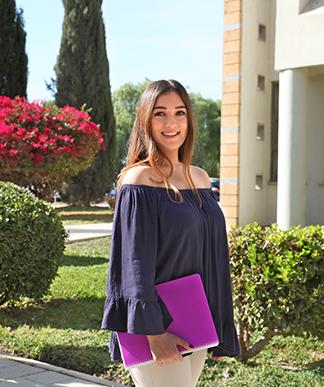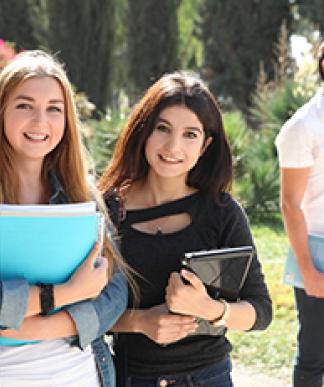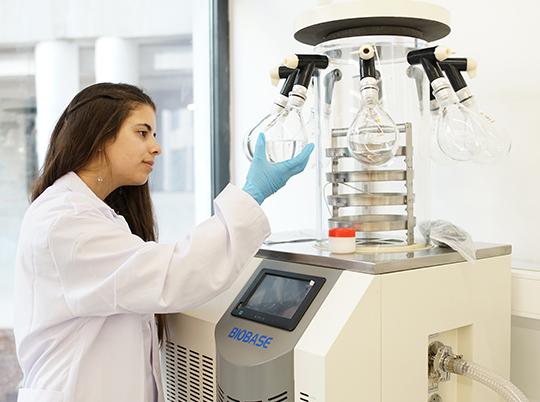


About the Program
Program gives students an in-depth understanding of mathematics, engineering principles, physics, chemistry, physiology, and modern biology. It also aims to: train students to apply basic sciences to biological problems using engineering principles; train students to do bioengineering research and solve problems related to the design and development of diagnostic and therapeutic technologies that improve human health; and train students to apply bioengineering research to commercially viable technologies. Biotechnology Research Centre (BRC) was established to develop international projects and accelerate research and development facilities in our country. The activities of this center are in the fields of cancer biology, microbiology and environmental sciences. BRC carries out projects with international partners such as Imperial College and University of Oxford. Bioengineering M.Sc. students will be supported to take part in these projects and improve themselves. This would help them to become highly experienced scientists and would also contribute to our society in the fields of cancer, microbiology and environment.
Education Opportunities
The program is designed to educate students in using engineering principles for the analysis and manipulation of biological systems to solve problems across a spectrum of important practices. Approved technical electives are chosen by each student in consultation with his/her graduate advisor and can be selected from a range of graduate courses on mathematics, statistics, engineering, physics, biotechnology, nanotechnology, biological processes, cancer research, etc. The research methods course offered to students helps them to improve their research skills. A supervisor who is expert in his/her field is assigned for each student to assist the students in preparing their seminars and designing a study plan to ensure that students receive cohesive education with a focus on a particular bioengineering area. Students carry out their experiments in modern laboratories equipped with high technology tools and equipment.

Career Areas
Bioengineering scientists have made countless revolutionary advances that have changed the way people live. Nowadays, about the emergence of bio-economy indicates that it is time to combine engineering principles with biology to develop new technologies. Research in bioengineering will strengthen our understanding of the basic principles of biological and environmental systems, create novel solutions to current health and environmental problems, and open new pathways for technological innovation. Bioengineering master program covers the fields of genetics, medicine and biotechnology. The program is ideal for professionals who seek greater depth in several areas of bioengineering; who wish to enhance their foundation for employment in all fields of biotechnology; and those who would like to prepare for the Ph.D. program.
Contact
Institute of Graduate Studies and Research
Graduate Sciences and Education Center, GE106
Tel: +90 392 671 1111 Extension: 2776
Institute E-mail: ciu-institute@ciu.edu.tr
Compulsory Courses
First Semester
ELECTIVE
Course code
BIOE5X1Credit
3Theoretical
3Practical
0Ects
8ELECTIVE
Course code
BIOE5X2Credit
3Theoretical
3Practical
0Ects
8ELECTIVE
Course code
BIOE5X3Credit
3Theoretical
3Practical
0Ects
8ELECTIVE
Course code
BIOE5X4Credit
3Theoretical
3Practical
0Ects
8Second Semester
THESIS
Course code
BIOE500Credit
0Theoretical
0Practical
0Ects
60SEMINAR
Course code
BIOE590Credit
0Theoretical
0Practical
0Ects
4ELECTIVE
Course code
BIOE5X5Credit
3Theoretical
3Practical
0Ects
8ELECTIVE
Course code
BIOE5X6Credit
3Theoretical
3Practical
0Ects
8ELECTIVE
Course code
BIOE5X7Credit
3Theoretical
3Practical
0Ects
8Elective Courses
BIOPROCESS ENGINEERING
Course code
BIOE308Credit
0Theoretical
0Practical
0Ects
RESEARCH METHODS
Course code
EMNT525Credit
3Theoretical
3Practical
0Ects
0BIOMEDICAL ENGINEERING AND INSTRUMENTATION
Course code
BIOE303Credit
0Theoretical
0Practical
0Ects
TECHIQUES IN MOLECULAR BIOENGINEERING
Course code
BIOE501Credit
3Theoretical
3Practical
0Ects
THERMODYNAMICS
Course code
ENRE301Credit
0Theoretical
0Practical
0Ects
PHYSIOLOGY FOR ENGINEERS
Course code
BIOE513Credit
3Theoretical
3Practical
0Ects
TECHNIQUES IN TISSUE CULTURE AND CELLULAR BIOENGINEERING
Course code
BIOE502Credit
3Theoretical
3Practical
0Ects
BIONANOTECHNOLOGY
Course code
BIOE522Credit
3Theoretical
3Practical
0Ects
BIOTECHNOLOGY
Course code
BIOE535Credit
3Theoretical
3Practical
0Ects
ECOLOGY
Course code
BIOE526Credit
3Theoretical
3Practical
0Ects
FERMENTATION MICROBIOLOGY
Course code
BIOE531Credit
3Theoretical
3Practical
0Ects
BIOSEPERATIONS
Course code
BIOE506Credit
3Theoretical
3Practical
0Ects
GENETIC ENGINEERING
Course code
BIOE510Credit
3Theoretical
3Practical
0Ects
OPTICAL IMAGING TECHNIQUES
Course code
BIOE504Credit
3Theoretical
3Practical
0Ects
ADVANCED TECHNIQUES OF ENVIRONMENTAL ENGINEERING ANALYSIS
Course code
ENVE528Credit
3Theoretical
3Practical
0Ects
BIOSENSORS
Course code
BIOE507Credit
3Theoretical
3Practical
0Ects
PROTEING ENGINEERING
Course code
BIOE520Credit
3Theoretical
3Practical
0Ects
TISSUE ENGINEERING
Course code
BIOE512Credit
3Theoretical
3Practical
0Ects
GENERAL BIOLOGY FOR ENGINEERS
Course code
BIOE112Credit
0Theoretical
0Practical
0Ects
7ADVANCED ANALYTICAL TECHNIQUES
Course code
CHEM508Credit
3Theoretical
3Practical
0Ects
GENERAL PHYSICS I
Course code
PHY101Credit
0Theoretical
0Practical
0Ects
LABORATORY APPLICATIONS IN ENVIRONMENTAL AND BIO TECHNOLOGIES
Course code
ENVE540Credit
3Theoretical
3Practical
0Ects
ADVANCED GENERAL CHEMISTRY
Course code
CHEM501Credit
3Theoretical
3Practical
0Ects
REPRODUCTIVE BIOLOGY AND EMBRYOLOGY
Course code
BIOT512Credit
3Theoretical
3Practical
0Ects
8FOOD BIOTECHNOLOGY
Course code
BIOT518Credit
3Theoretical
3Practical
0Ects
8CALCULUS I
Course code
MAT101Credit
0Theoretical
0Practical
0Ects
ADVANCED PHARMACOGNOSY-II
Course code
PRCO504Credit
3Theoretical
2Practical
2Ects
10STATISTICAL METHODS IN BIO&ENVIRONMENTAL SCIENCES
Course code
ENVS541Credit
3Theoretical
3Practical
0Ects
STATISTICAL METHODS IN BIO&ENVIRONMENTAL SCIENCES
Course code
ENVE541Credit
3Theoretical
3Practical
0Ects
ENVIRONMENTAL BIOTECHNOLOGY
Course code
ENVE525Credit
3Theoretical
3Practical
0Ects
STATISTICS AND DATA ANALYSIS
Course code
BIOE505Credit
3Theoretical
3Practical
0Ects
ADVANVED TECHNIQUES OF ENVIRONMENTAL ENGINEERING ANALYSIS
Course code
ENVS528Credit
3Theoretical
3Practical
0Ects
REMOVAL OF ORGANICS FROM WATER
Course code
ENVE513Credit
3Theoretical
3Practical
0Ects
SPECIAL TOPICS IN BIOENGINEERING I
Course code
BIOE532Credit
3Theoretical
3Practical
0Ects
ADVANCED PHARMACOGNOSY I
Course code
PRCO503Credit
3Theoretical
2Practical
2Ects
0NUTRACEUTICALS
Course code
PRCO507Credit
3Theoretical
3Practical
0Ects
8ADVANCED AIR POLLUTION
Course code
ENVS509Credit
3Theoretical
3Practical
0Ects
PHARMACEUTICAL TOXICOLOGY I
Course code
PHAR308Credit
0Theoretical
0Practical
0Ects
PHARMACOLOGY I
Course code
PHAR210Credit
0Theoretical
0Practical
0Ects
PLANT GROWTH REGULATORS
Course code
PSCT503Credit
3Theoretical
3Practical
0Ects
8Students who are interested in pursuing advanced graduate studies leading to a master’s, doctoral degree, or professional doctorate degree for the Fall and Spring semesters every year. Applicants can directly apply online to our graduate programs using the application portal.
TRNC Applicants- Required documents:
- Bachelor’s Degree Diploma
- Bachelor’s Degree transcripts for each completed academic term/year.
- Documents to prove English proficiency for English language departments,
- Scanned copy of passport or identity card.
Click for detailed admission requirements information.
Students who are interested in pursuing advanced graduate studies leading to a master’s, doctoral degree, or professional doctorate degree for the Fall and Spring semesters every year. Applicants can directly apply online to our graduate programs using the application portal.
International Applicants- Required documents;
- Bachelor’s Degree Diploma
- Bachelor’s Degree transcripts for each completed academic term/year.
- Evidence of English Language competence: TOEFL (65 IBT) or IELTS (5.5). Students without these documents will take the CIU English proficiency exam on campus following arrival.
- Scanned copy of international passport/birth certificate
- CV
- Fully completed and signed CIU Rules and Regulations document (which can be downloaded during the online application)
Click for detailed admission requirements information.
Cyprus International University provides academic scholarships for its students as an incentive for success, with most students benefiting from 50%, 75% or 100% scholarships or discounted tuition fees. Click for more information.
Tuition Fees are determined at the beginning of each academic year. Candidate students who are entitled to enroll in CIU can learn their fees in line with the Tuition Fee Calculation system.